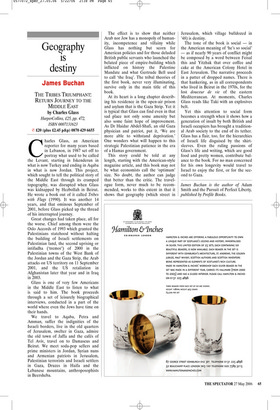Geography is destiny
James Buchan
THE TRIBES TRIUMPHANT: RETURN JOURNEY TO THE MIDDLE EAST by Charles Glass HarperCollins, £25, pp. 472, ISBN 0007131623 ✆ £20 (plus £2.45 p&p) 0870 429 6655 Charles Glass, an American reporter for many years based in Lebanon, in 1987 set off to portray what used to be called the Levant, starting in Iskenderun in what is now Turkey and ending in Aqaba in what is now Jordan. This project, which sought to tell the political story of the Middle East through its cramped topography, was disrupted when Glass was kidnapped by Hezbollah in Beirut. He wrote a book out of it called Tribes with Flags (1990). It was another 14 years, and that ominous September of 2001, before Glass picked up the thread of his interrupted journey.
Great changes had taken place, all for the worse. Chief among them were the Oslo Accords of 1993 which granted the Palestinians statehood without halting the building of Israeli settlements on Palestinian land, the second uprising or intifadha (‘tremor’) of 2000 in the Palestinian towns of the West Bank of the Jordan and the Gaza Strip, the Arab attacks on US territory on 11 September 2001, and the US retaliation in Afghanistan later that year and in Iraq in 2003.
Glass is one of very few Americans in the Middle East to listen to what is said to him. The book proceeds through a set of leisurely biographical interviews, conducted in a part of the world where even the Jews have time on their hands.
We travel to Aqaba, Petra and Amman, suffer the indignities of the Israeli borders, live in the old quarters of Jerusalem, swelter in Gaza, admire the old town of Jaffa and the cafés of Tel Aviv, travel on to Damascus and Beirut. We meet soda-pop sellers and prime ministers in Jordan, Syrian nuns and Armenian patriots in Jerusalem, Palestinian terrorists and Israeli settlers in Gaza, Druzes in Haifa and the Lebanese mountains, anthroposophists in Beersheba. The effect is to show that neither Arab nor Jew has a monopoly of humanity, incompetence and villainy while Glass has nothing but scorn for American policies and for those deluded British public servants who launched the belated piece of empire-building which inflicted on history the Palestine Mandate and what Gertrude Bell used to call ‘the Iraq’. The tribal theories of the first book, never very illuminating, survive only in the main title of this book.
At its heart is a long chapter describing his residence in the open-air prison and asylum that is the Gaza Strip. Yet it is typical that Glass can find even in that sad place not only some amenity but also some faint hope of improvement. As Dr Haidar Abdel-Shafi, an old Gaza physician and patriot, put it, ‘We are more able to withstand deprivation.’ One wonders what will happen to this strategic Palestinian patience in the era of a Hamas government.
This story could be told at any length, starting with the American-style magazine article, and this book may not be what economists call the ‘optimum’ size. No doubt, the author can judge that better than the critic. The travelogue form, never much to be recommended, works to this extent in that it shows that geography (which street in Jerusalem, which village bulldozed in ’48) is destiny.
The tone of the book is social — in the American meaning of ‘he’s so social’ — as if nearly 90 years of conflict might be composed by a word between Feisal this and Yitzhak that over coffee and cake at the American Colony Hotel in East Jerusalem. The narrative proceeds in a patter of dropped names. There is that hankering, as in all correspondents who lived in Beirut in the 1970s, for the lost douceur de vie of the eastern Mediterranean. At moments, Charles Glass reads like Taki with an explosives belt.
Yet this attention to social form becomes a strength when it shows how a generation of insult by both British and Israeli occupiers has brought a traditional Arab society to the end of its tether. Glass has a flair, too, for the hierarchies of Israeli life disguised by the shirtsleeves. Even the ruling passions of Glass’s life and writing, which are good food and pretty women, contribute balance to the book. For no man concerned for his own longevity would travel to Israel to enjoy the first, or for the second to Gaza.
James Buchan is the author of Adam Smith and the Pursuit of Perfect Liberty, published by Profile Books.










































































































 Previous page
Previous page